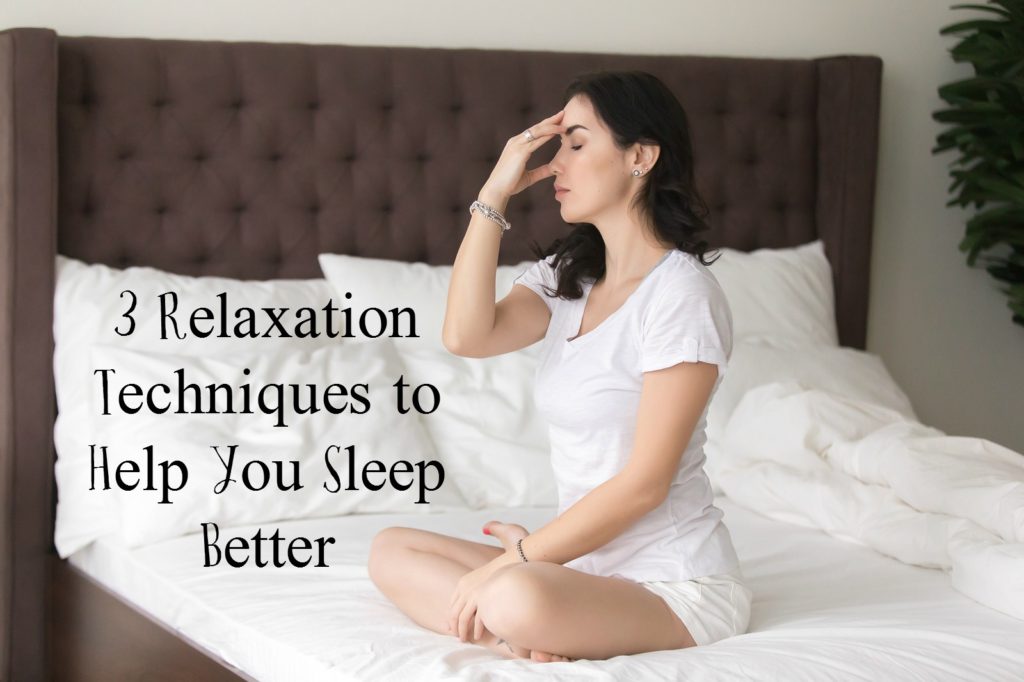Do you lie awake at night and worry about things like the future, family, work, health, relationships or finances? Is your busy mind keeping you from getting much-needed rest? Do you become anxious worrying about whether or not you will ever be able to fall asleep because of all this overthinking? You are not alone. Stress will not only make you irritable and tense throughout the day but can also make it difficult to fall asleep and stay asleep at night. The reason for this is that stress puts you in a state of hyperarousal that causes your blood pressure and breathing rate to increase.

Practicing relaxation techniques before bed to unwind from a busy day and calm your mind can be an effective way to help you get the rest you need. Try one of these simple techniques the next time you’re in bed struggling to get some shut eye.
Toe Tensing
Telling you to do something with the word “tensing” in it to relax may sound odd, but it works. Lie down on your back and close your eyes. Focus on your toes. Tense and pull all ten toes up toward your face. Hold them like that for a slow count of ten. Next, release and slowly count to ten. Repeat about 10 times.
Progressive Relaxation
This technique comes from the University of Maryland’s Sleep Disorder Center. They suggest that you tape the instructions beforehand so as not to miss a step. You should read them slowly and leave a short pause after each one or you can listen to the progressive muscle relaxation track on the Universities “Falling Asleep” CD. These are the steps as provided by the University.
- Lie on your back, close your eyes.
- Feel your feet. Sense their weight. Consciously relax them and sink into the bed. Start with your toes and progress to your ankles.
- Feel your knees. Sense their weight. Consciously relax them and feel them sink into the bed.
- Feel your upper legs and thighs. Feel their weight. Consciously relax them and feel them sink into the bed.
- Feel your abdomen and chest. Sense your breathing. Consciously will them to relax. Deepen your breathing slightly and feel your abdomen and chest sink into the bed.
- Feel your buttocks. Sense their weight. Consciously relax them and feel them sink into the bed.
- Feel your hands. Sense their weight. Consciously relax them and feel them sink into the bed.
- Feel your upper arms. Sense their weight. Consciously relax them and feel them sink into the bed.
- Feel your shoulders. Sense their weight. Consciously relax them and feel them sink into the bed.
- Feel your neck. Sense its weight. Consciously relax it and feel it sink into the bed.
- Feel your head and skull. Sense its weight. Consciously relax it and feel it sink into the bed.
- Feel your mouth and jaw. Consciously relax them. Pay particular attention to your jaw muscles and unclench them if you need to. Feel your mouth and jaw relax and sink into the bed.
- Feel your eyes. Sense if there is tension in your eyes. Sense if you are forcibly closing your eyelids. Consciously relax your eyelids and feel the tension slide off the eyes.
- Feel your face and cheeks. Consciously relax them and feel the tension slide off into the bed.
- Mentally scan your body. If you find any place that is still tense, then consciously relax that place and let it sink into the bed.
Alternate Nostril Breathing
Bring on deep relaxation using alternate nostril breathing. According to Amita Patel, founder of Aligned Holistics, in an article for the Huffington Post, alternate nostril breathing balances out the left and right sides of the brain while calming the nervous system.
Her instructions are as follows. Rest your right finger and thumb on either side of your nostrils, lightly touching them. Take a deep breath in and a big breath out, then close the right nostril with your thumb and inhale through the left nostril for a count of four. At the top of that breath, close off the left nostril with your finger and hold for a count of four, then release the right nostril and exhale for four counts. Repeat for as many cycles as comfortable until you feel relaxed. End with the left nostril.
Remember, to help relax and fall asleep at night keep your room dark. Turn all electronics off, rotate your clock away from you. If you are having trouble falling asleep DO NOT watch the clock or check your phone. This can add to your stress and keep you awake longer. Just remind yourself that your body will eventually take over and help you fall asleep. If you are awake for more than 20 minutes in bed, move to a different part of the house (avoiding bright lights and electronics that will wake you up more). Do something relaxing for a little while, until you begin to feel tired then go back to bed.
Everyone has trouble falling asleep because of stress occasionally, but if sleepless nights have become a regular occurrence for you, there may be more to it than just stress. We suggest you schedule a sleep consultation at one of our five convenient Valley locations to help determine what keeps you up at night.

